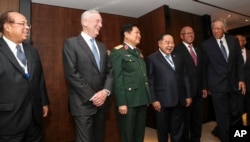Indian Prime Minister Narendra Modi offered a thinly veiled criticism of China, even while insisting on closer relations with Beijing, during a speech Friday in Singapore.
Speaking at the annual Shangri-La Dialogue defense conference, Modi called for the Indo-Pacific region to embrace freedom of navigation, territorial integrity, and respect for all nations, regardless of their size.
"We will promote a democratic and rules-based international order in which all nations, small and large, count as equal and sovereign," the Indian prime minister said. "We will work with others to keep our seas, space and airways free and open."
While those comments did not specifically mention China, Modi's remarks are seen as a reference to Beijing's increasingly assertive behavior toward its smaller neighbors in disputed areas of the South China Sea.
Criticism of US
Modi also implicitly criticized the United States. He slammed growing protectionism, presumably a reference to recent tariffs imposed by U.S. President Donald Trump. He also said nations should keep their commitments — a possible reference to Trump's decision to pull out of the Iran nuclear deal.
India has grown close with the U.S., especially as China projects its growing military power beyond its shores.
The U.S.-India relationship, Modi said, "has resumed new significance in the changing world." An important aspect of that partnership is "a shared vision of an open, stable, secure and prosperous Indo-Pacific," he added.
For decades, India has embraced a non-aligned status, which means it does not choose sides between world powers. In keeping with that position, Modi warned against a "return to great power rivalries."
The Indian prime minister also insisted that "Asia and the world will have a better future when India and China work together in trust and confidence, sensitive to each other's interests."
India's global role
India is the world's largest democracy. It has the world's seventh-largest economy. Within a decade, it is expected to pass China to become the world's most populous country.
But its rising global stature has not come with a corresponding increase in influence at international institutions. India has long lobbied to become a permanent member of the U.N. Security Council. It also wants greater voting rights at the World Bank.
During Friday's speech in Singapore, Modi said he supported expanded Indian involvement in global affairs, including international peacekeeping, humanitarian assistance, and disaster relief.
China not excluded
While some in the U.S. see India as a crucial counterweight to China, Modi insisted India's partnerships are not meant to exclude Beijing.
India, along with Australia, Japan, and the United States, are part of the Quadrilateral Security Dialogue — a grouping that some say could provide a more unified Pacific front against China.
In November, the members of the Quad met for the first time since 2007. No meeting of the Quad is expected to be held this week at the Shangri-La Dialogue.
"India does not see the Indo-Pacific region as a strategy or as a club of limited members, nor as a grouping that seeks to dominate," Modi said. "And by no means, do we consider it as directed against any country."
The Shangri-La Dialogue, an annual meeting of Asian defense and other leaders, this year focused heavily on the idea of the "Indo-Pacific" region.
The emphasis comes after the U.S. military this week renamed its largest area of operations from "PACOM" to "Indo-PACOM."
The move is seen partly as a U.S. acknowledgment that India will play a bigger role in the region.
Modi is the first Indian prime minister to speak at the Shangri-La Dialogue, which began in 2002.





